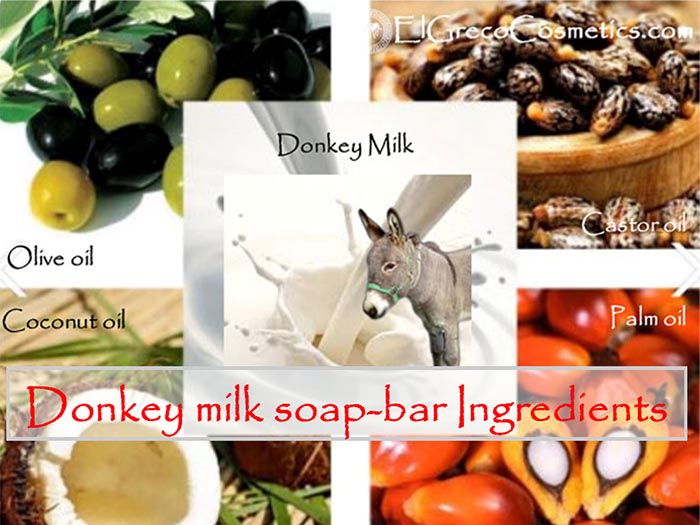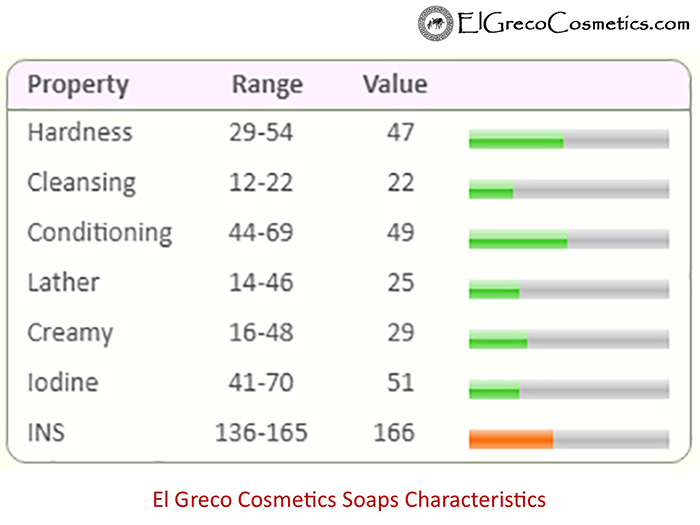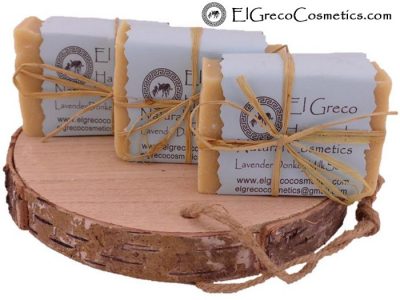Description
Natural Shaving Donkey milk Soap 100gr
100gr Natural Shaving Donkey milk Soap
Great for all skin types. Sensitive skin and dry skin.
Ingredients:
- Saponified oils of Olive, Coconut, Palm, and Castor
- Donkey Milk
- Bentonite Clay
- Unschent
- Ingredients INCI: Sodium cocoate. Sodium palmate. Sodium Olivate. Sodium Castorate. Donkey milk. Glycerine. Bentonite
Please let us know upon your order which one of the above you prefer!
Our shaving donkey milk soaps are handcrafted. Using the cold saponification process method. With which all the benefits of ingredients retain. Fresh milk from the donkey’s of our farm.
Great for all skin types. Sensitive skin, dry skin. Including people that have eczema or psoriasis.
How can you use Donkey’s milk soap? …Lather soap onto hands or a washcloth and apply it to your face and body.
Donkey Milk in Shaving Donkey milk Soap
Always known but forgotten for a while. Donkey milk reappears as the star of cosmetics. And promises great benefits and fantastic results. Donkey Milk (or asses’s Milk) is the closest mammal milk to human milk in biochemical composition.
It contains Casein, Albumin, Fat. Lactose, Salt and Water. Very rich in vitamins (A, B1, B2, B6, D, C and E. Its very high vitamin C content. Also slows down the aging process).
Minerals and trace elements (calcium, magnesium, phosphorus, sodium, iron, zinc). Biostimulants (immunoglobulins) and Glycerol alkyl.
Thanks to its rich composition, it is an excellent moisturizer. Which is very effective as an anti-age treatment and essential fatty acids it contains anti-aging. Regenerative, and healing properties.
A little bit of history
The most famous of the great days of yore who regularly bathed in donkey’s milk is certainly Cleopatra. Queen of Egypt to maintain her beauty. The legend says that there should be no less than 700 donkeys. To provide the quantity of milk needed for daily baths.
Donkey milk was used until the early twentieth century as a substitute for milk. More recently, studies show that donkey milk could serve as an alternative to cow’s milk. For children with milk protein allergy.
Great cosmetic virtues
Sensitive skin. Who have an allergic reaction to many care more easily tolerate cream with donkey milk.
The milk of donkeys is regenerative for the skin. Because of high levels of protein, phospholipids, and ceramides. Which in turn confer it with both soothing and restructuring properties.
This product possesses a verified anti-wrinkle effect.
Eliminates wrinkles. And prevents these from appearing product of the passing of time in the skin. Face, and neck.
On the other hand, it eliminates and reduces the signs of expression.
Donkey Milk Facial Cream is also a powerful tensor and hydratator of the skin.
Olive Oil, Coconut oil, Palm oil, Castor oil in Shaving Donkey milk Soap?
These oils are carefully blended together to produce a superior handcrafted soap.
Each of these oils is chosen for the special characteristics that it gives to the soap.
Olive Oil
Olive oil makes a gentle soap that’s kind to the skin.
Is rich in vitamins A, D, E, F and K. antioxidants and phenols.
Contains 70% monounsaturated fatty acid.
This Contains polyphenol which helps in stronger cell walls.
It is anti-inflamed. Slows the natural aging process of the human body.
Protects the epidermis from external irritation.
And It protects of skin cancer. Really helps to slow down growing older of the liver.
Helps slow up the buildup from mostly synthetic hair care products. And environmental impurities that leave your hair feeling brittle and dull.
Olive oil does wonders for the skin. Which gets a natural shine and glow from the enriching oil.
It is recommended to individuals who suffer from skin color rashes. Eczema, psoriasis. And allergies. Shaving Donkey milk Soap
Coconut oil
Coconut oil provides natural cleansing and bubbly lather.
It contains:
1) medium-chain fatty acids or triglycerides,
2) Capric / Caprylic / Lauric acid,
3) Vitamin-E.
Coconut oil properties:
Retains moisture content of the skin.
Protects skin from Microbial infections.
Delays the aging process, repairs skin and gives it a healthy glow.
Great skin softener. Softens feet and clears the cracks. Is good for several skin disorders such as acne, psoriasis, and eczema.
Palm oil
Palm oil makes a soap that is harder. Yet cleans well and feels like you want the soap to feel as you use it.
It contains Vitamins such as very high Beta-carotene, A, D, and E, Beneficial in the prevention of skin cancer.
Castor oil
Castor oil Effective to make rich suds (foam) and moisturizing properties to the final product.
Protects scalp from microbial infections and reduces hair fall.
Useful for treating skin diseases caused by microbial infections and skin ulcers.
Effective treatment rheumatism, arthritis, and gout. Shaving Donkey milk Soap
Bentonite Clay
Bentonite clay is a natural clay with a fine, soft texture. It forms a paste when mixed with water.
Some people use this paste for medical or cosmetic benefits. Such as treating rashes and acne or as a hair mask and shaving.
Summary
This clay is an ancient remedy that could hold promise as a treatment for various health conditions. It has a low risk of side effects when a person uses it in moderate amounts.
As with any natural remedy, people with health conditions should talk with their doctor. Before using bentonite clay to be sure that it is safe.
Is present in many skin products. But some people also add it to foods or drinks with the aim of relieving digestive issues. Or removing toxins from the body.
Many studies have looked at the health benefits of bentonite clay. Though most of this research has used animal or cell models.
People have used bentonite clay to remove impurities on the skin. Such as oils, and toxins from the body for thousands of years.
Scientists believe that bentonite clay works by adsorbing oils and dirt from the skin.
The theory is that bentonite clay adsorbs materials by sticking to their molecules or ions. As the clay leaves the body, it takes the toxin or other molecules with it.
When a person uses it on the skin, bentonite clay may have the power to adsorb oils and bacteria. When they consume the clay, it may adsorb toxins or other unwanted substances from the digestive tract.
Contains natural minerals such as calcium, magnesium, and iron, which may provide additional benefits.
Forms from volcanic ash. It gets its name from Fort Benton in Wyoming, where it occurs in large amounts. People can also find this clay in other places where volcanic ash has settled into the ground. Montmorillonite clay, named after Montmorillon in France, is the same type of clay.
Bentonite Benefits
Removing toxins from the body
Treating oily skin and acne
Detoxifying the skin
Is Treating poison ivy
Removing lead and other heavy metals
Helps your razor glide across the skin easily.
Bentonite is an extremely slippery substance. You can use it in drilling mud,
This Clay added for increased soothing, slippery, and cushioning lather.
Honeysuckle essential oil in Shaving Donkey milk Soap.
The bioactive compounds in honeysuckle are the main reason it’s identified as “a plant of phytopharmaceutical importance,”. According to a 2015 study, which notes that “Flavonoids, alkaloids, phenolic acids, terpenes.”
Major parts of this plant have medicinal properties. Flower buds have anti-cancer and anti-inflammatory properties. And leaf has antioxidant and tyrosinase inhibition properties.
Among the many benefits, growers have discovered with this plant is that the fruit ripens early. And has an extraordinary resistance to frost, pests, and diseases. The botanical name Lonicera caerulea covers varieties with such names as honeyberry. Blue honeysuckle. Sweet berry honeysuckle. Edible honeysuckle, and haskap.
Honeysuckle properties. Shaving Donkey milk Soap
1. Skincare —
Exfoliation and facial steam are two ways you can benefit from using honeysuckle. As it can improve such skin irritants as poison oak and infections. As well as cuts and abrasions. They demostrat that you can inprouve Blemished skin with use of honaeysuckle.
2. Anti-inflammatory —
Honeysuckle oil soothes aching joints and sore muscles. Particularly for arthritis sufferers. A simple way to use it is by adding it to your bath to reduce muscle pain.
3. Respiratory benefits —
You can use to make an infusion of European honeysuckle flowers a tea that’s helpful for treating coughs and colds. As well as upper respiratory tract infections and asthma.
Honeysuckle essential oil in Shaving Donkey milk Soap.
4. Antibacterial — Partly because of its antibiotic properties, Japanese honeysuckle they use to treat infections caused by streptococcal bacteria. Part of this ability is due to the naturally high concentration of aromadendrene (a terpene found in plants). That honeysuckle contains. Helping to stop bacterial growth.
As an antiseptic cleaning agent, it’s also a great cleanser with the added benefit of a pleasant fragrance. Try three drops of honeysuckle oil with 1 cup of white vinegar. And 1 cup of water in a spray bottle. In cleaning your kitchen or bathroom, it’s a great alternative to use on sinks, countertops, toilets, showers and floors.
5. Antimicrobial —
Honeysuckle extracts have demonstrated the ability to inhibit microbial growth. But between the two types, Japanese Honeysuckle has higher antimicrobial content.
6. Aroma-therapeutic —
A few drops of the oil extracted from honeysuckle flowers offer a sweet aroma. That can relieve both mental and physical stress and promote a tranquil state of mind. You can use the oil in a diffuser or for a massage. In your bath. You can add honeysuckle essential oil with Epsom salts. To help it distribute evenly in the water.
Peppermint (Mint) Essential oil in Shaving Donkey milk Soap.
Peppermint is an aromatic herb in the mint family. It’s a hybrid mint that’s a cross between spearmint and watermint.You can find it naturally in North America and Europe.
You can extract Peppermint essential oil from the leaves of the peppermint plant. And use it for a variety of different purposes.
Peppermint (Mint) Essential oil for skin and hair.
Men use often Peppermint oil in cosmetic products.
This oil also has mild antimicrobial properties.
Brightens Your Complexion
Rejuvenates Your Skin
Hydrates Your Skin
Tones Your Skin
Slows Aging
Sandalwood Essential oil in Shaving Donkey milk Soap.
You can find Sandalwood oil in many perfumes and air fresheners. It’s a classic scent from a valuable tree. But the value of sandalwood oil may go beyond smell. Sandalwood may offer some health benefits as well.
Sandalwood oil comes from the wood and roots of Santalum album, or the East Indian sandalwood tree. This is one of the most valuable trees in the world. In West Indian and African produced sandalwood oils also in the past. But they’re no longer widely available.
They Highly valued Sandalwood and its oil in alternative medicine. You can use it traditionally to treat a variety of conditions. Some research suggests sandalwood may help treat certain health problems.
Sandalwood oil Benefits
increase alertness
manage anxiety
support wound healing
guard against skin cancer
fight bacteria
















Reviews
There are no reviews yet.